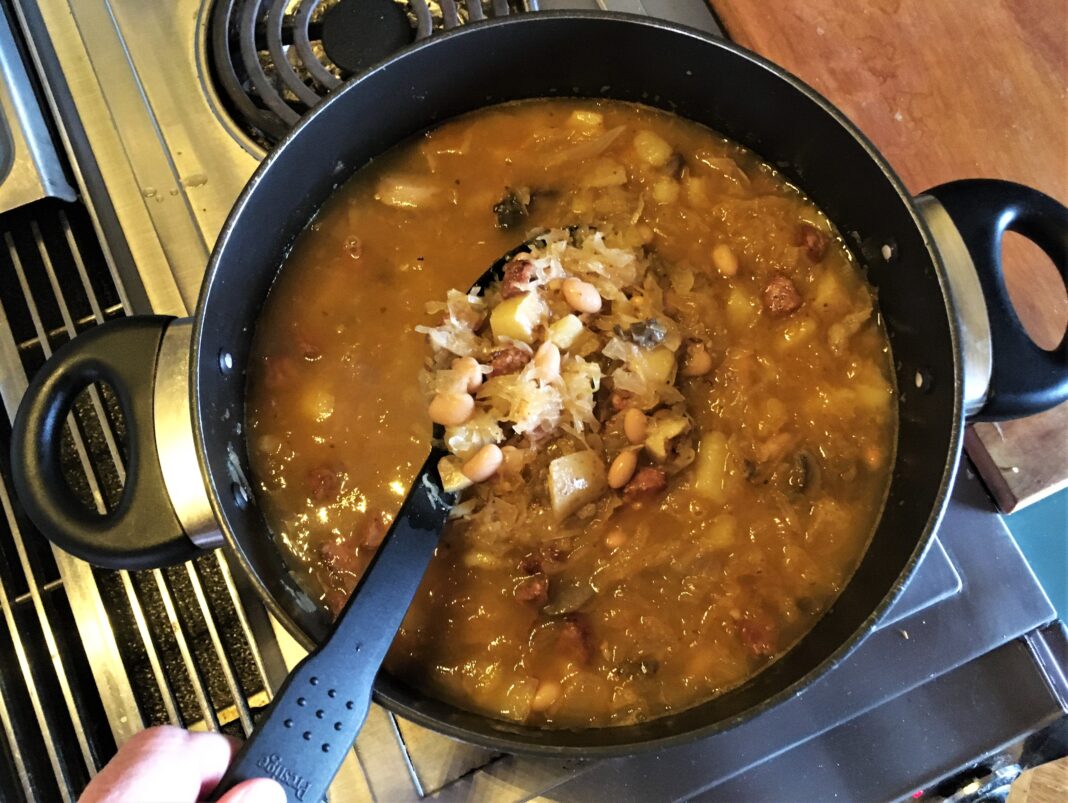In a quickly forgotten context just the other day at Facebook, I made the comment to someone that “beer is good food.”
Somewhere in the deep recesses of my brain-wave labyrinth I knew the Dead Kennedys recorded a song in 1985 called “Soup Is Good Food,” the title of which will make sense to certain more chronologically advanced readers as a Campbell’s advertisment from the late 1970s.
We’re sorry, but you’re no longer needed
Or wanted or even cared about here
Machines can do a better job than you
And this is what you get for asking questions
However, I was not familiar with The Assmen, an “abrasive old school punk band” from northeastern Ohio, whose song “Beer Is Good Food” can be found in the 1999 album Enema Nation. It’s really quite good.
To summarize: Both soup and beer are good food, preferably ingested together, hence my determination to inflict this recipe on my readers.
I call it “Eastern European Sauerkraut Soup,” and if you’re one of those inexplicably squeamish sorts who refrain from kraut, please return immediately to your Dupe Island Beanie Baby Brand Stout collection, coax one gently from the lockbox, make sure to get a photograph to attest to the moment, and pair it with chicken fingers.

Meanwhile, my sauerkraut soup represents all-purpose former East Bloc country cooking that would fit like a glove in Gdansk, Gmünd or Gyöngyös.
(That’s Poland, Austria and Hungary.)
The recipe is intended to be easy, with most of the ingredients store-bought and precooked, with the bulk of time spent cutting potatoes. If you make your own stock or kraut, that’s great, although it isn’t necessary. Soak the beans overnight and avoid cans? Also fine, as is varying the type of mushrooms and sausages.
Simple ingredients seem to work best. You’re preparing this to be served in a worker’s cafeteria, not a trendy bistro, and the recipe is intended as an approximation.
As for the seasonings, I’ve yet to see two recipes that agree on which should be used and how to use them, so feel free to experiment. I’m not always a huge fan of black pepper, but this soup benefits hugely from it, and using simple Hungarian sweet paprika balances the kraut’s sourness while adding color to the soup.
This recipe yields a lot of soup, because I usually make it for holiday gatherings. It’s calculated to use most of a six-quart stock pot. You can cut it down, or do like we do and freeze leftovers for later meals on snowy days, if we get any.
Eastern European Sauerkraut Soup
Main Ingredients
- 32 oz bag of sauerkraut from the refrigerator section, rinsed
- Two 15.5 oz cans Great Northern Beans, rinsed
- 16 oz pre-sliced white mushrooms
- 16 oz smoked sausage, skinned and cut bite-sized (omit to render the soup vegetarian)
- 2 lbs gold or red potatoes, cut to bite-sized
- One large onion, chopped
- Four or five cloves garlic, minced
- A bit of olive oil (or whatever type oil you prefer)
- I use a total of three quarts broth or stock; in 2020, 64 ounces vegetable broth and 32 ounces chicken broth, both store bought. This is an approximate liquid proportion, capable of variance. Substitute beer for some of it if you wish, but if Lite beer is all you have, don’t bother, because that’s just water.
Seasonings (have them combined and ready to add)
- Quarter to a half teaspoon black pepper
- Quarter teaspoon allspice
- Teaspoon marjoram
- Heaping tablespoon of caraway seeds
- One and ½ tablespoons sweet paprika (throw some hot paprika in there if you wish)
(My personal recommendation, albeit optional, is to have sour cream on hand to stir into your bowl of finished soup.)
Preparation
It isn’t rocket science, this recipe. Begin with a few circles of oil, and saute the onions and garlic on medium heat for a few minutes. Then add the sausage and brown it some; if it’s precooked sausage, there won’t be much in the way of leftover grease but remove any if it develops (if you wish; whatever).
Add seasoning batch and mix with onions, garlic and sausage. Deglaze with broth or a bit of beer or wine if you have some handy. At this point I add the sauerkraut and the first 32 oz of broth, get it to a vigorous boil, then reduce the heat and allow it to simmer on low heat for half an hour or so.
Then stir in everything else: beans, mushrooms, potatoes and the rest of the broth (the idea is to cover the ingredients with broth, and the soup/stew liquid quotient as varies to personal preference).
Bring to a vigorous boil, reduce heat and cook on low until the potatoes are done to your liking.
My custom is to make this soup the day before we intend to eat it, although we’ll certainly taste it and maybe have an experimental bowl the first day. By the time you let it sit on the stove to cool, then stash in the fridge and reheat the following day, it will be much improved. Get the most flavorful rye or pumpernickel bread you can find.
This isn’t wine-pairing food; beer obviously goes best with it, although the Poles would have quality vodka, too. What I’ve consumed with it most often are malt-foward lagers, as my consciousness cannot grasp drinking a Hazy IPA or fruit-laden sour with such a noble soup. Examples include Dunkel Lager (or perhaps Dunkel Weizen for a spicy twist), Black Lager, Bohemian Pilsner or Kellerbier.


















 Roger Baylor is an educator, entrepreneur and innovator with 40 years of hands-on experience and expertise as a beer seller, restaurateur and commentator. As the co-founder of New Albany’s Sportstime Pizza/Rich O’s Public House (which later became New Albanian Brewing Company) in the 1990s and early 2000s, Baylor played a seminal role in Louisville’s craft beer renaissance. Currently he is the beer director at Pints&union in New Albany and Common Haus Hall in Jeffersonville. Baylor’s “Hip Hops” columns on beer-related subjects have been a fixture in F&D since 2005, and he was named the magazine’s digital editor in 2019.
Roger Baylor is an educator, entrepreneur and innovator with 40 years of hands-on experience and expertise as a beer seller, restaurateur and commentator. As the co-founder of New Albany’s Sportstime Pizza/Rich O’s Public House (which later became New Albanian Brewing Company) in the 1990s and early 2000s, Baylor played a seminal role in Louisville’s craft beer renaissance. Currently he is the beer director at Pints&union in New Albany and Common Haus Hall in Jeffersonville. Baylor’s “Hip Hops” columns on beer-related subjects have been a fixture in F&D since 2005, and he was named the magazine’s digital editor in 2019.



